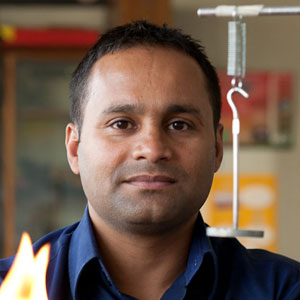Of all the places where the United States might get involved, Sudan is one of the most unlikely. Unless you count a few million potential candidates for the Christian missionary business, there's little to interest outside entrepreneurs, and the oil reserves are not enough to make a serious difference to anything. What Sudan does have in extraordinary abundance is problems. And thanks to a surprising chain of events, it looks as though some of these problems now belong to the United States, too. There are so many highly charged factors – slavery, religious persecution, fundamentalism (both Christian and Muslim), dictatorship, murder, ethnic strife, rape and famine – that it's difficult to see through the tangle of complications. This has led to a sequence of drastically simplified views of what is actually happening.
The first oversimplification, dating back to Bill Clinton's presidency, is that Sudan means slavery. Sudan caught the attention of human-trafficking activists: they, in turn, passed the fever on to congregations in African-American churches. From the churches, the issue spread into wider black political circles, and you can see why.
"My ancestors were slaves. African-Americans can relate to slavery more intimately, politically, socially and spiritually, than they can anything else," said left-wing talk-adio host Joe Madison in 2001.
It is this connection that first made Sudan an American political issue.
This political path led to the Democratic Congressional Black Caucus, Rev. Al Sharpton and what you could loosely call a liberal idea. But the anti-slavery issue was not quite enough to reach mainstream white churchgoers, key members of the Bush II voter base. Hence, oversimplification number two: The war in Sudan was essentially about the persecution of Christians by Muslims.
This 'de-blacked' message was one that white evangelicals and Republican politicians could be comfortable with; and so, on 22 March, 2001, Republican Dick Armey, at that time House Majority Leader and ally of the evangelicals, said of Sudan: "It is the only place in the world in which religious genocide is taking place. People are being tortured, mutilated and killed solely because of their Christian faith."
But like slavery, the persecution of Christians is a side issue in Sudan, where some estimates put Christians as outnumbered two or three-to-one by those with traditional beliefs in spirits and magic. Indeed, many of the people now counted as Christians are recent converts, the targets of European and American missionary campaigns, and in many cases are still believers in traditional spirituality as well. Even by evangelical American standards, there are some weird versions of Christianity on offer. The notoriously brutal Lord's Resistance Army, for instance, a Ugandan group also operating in southern Sudan, claims to want a society based on the Ten Commandments – and abducts children to be slave troopers.
The Muslim/anti-Muslim explanation falls apart when you realise that there are also Christians in the north (including some historical communities that have been there for centuries) and some Muslims in the mainly Christian and animist south. In fact, the issue of self-determination for the south has been a contentious issue since the years before independence in 1956, and it seems to cut straight across religious lines. Khartoum has been trying to run a centralised state, while the rebel leaders in the south of the country have wanted either to secede or achieve local power sharing. The various wars of secession are just that: attempts to establish political autonomy for regions or territories where Khartoum's rule is not accepted. This unromantic interpretation – that these are political wars, rather than slave rebellions or self-defence struggles for tormented Christians – is one that rarely gets an airing in Washington.
Against this background, the Bush administration decided to get involved. After Somalia, there was no question of military involvement, but the State Department threw its weight behind the idea of peaceful negotiations.
This surprised the Sudanese. America, after all, had stood by while a number of other roughly similar African countries melted down. Why pick on them? Once they realised what was happening – that they were on the receiving end of televised visits from leading American evangelists – the Khartoum government started to denounce the American religious right for interfering in Sudanese affairs.
The 'peace envoy' sent by the Bush administration in 2002 to oversee their Sudan engagement was retired Senator John 'Saint Jack' Danforth, who last month replaced John Negroponte as US Ambassador to the UN. Danforth is an ordained Episcopalian minister who has described himself as "a warrior doing battle for the Lord".
On paper, the US-led diplomatic effort has seen modest success, with a ceasefire declared in April and a power-sharing agreement between the government and the rebels in the south of the country accepted in principle by both sides. But in Darfur the mysterious Janjaweed militias continue their marauding like a vision of hell: bands of fanatical, machinegun-toting Arab horsemen spreading death and terror among the black population. Well, not really.
The Janjaweed come with slogans of jihad and racial superiority, and this kind of talk has helped encourage oversimplification number three among foreign observers: that it is all about racial division.
Take a look at pictures of the Janjaweed, and you will see that in large part they are as black as the 'blacks' they are murdering. 'Arab' in Sudan is mainly a cultural identity, meaning 'Arabic-speaking' more than anything. Groups calling themselves 'Arabs' are likely to claim Arab ancestry too, but this is not based on fact. The word translated in news reports as 'black' is actually 'blue', and while it is a racial term, this has also now become a cultural label, referring to those still speaking African languages and still living a traditional lifestyle. With as many as 134 languages and 497 ethnic sub-groups catalogued in the country, there is a wide spectrum of ethnic identities available, including many Arabised groups that only recently switched from a traditional language to Arabic. In America, the idea that the population is neatly divided into two racial groups – blacks and Arabs – has taken root in people's minds. This suggests a morally simple apartheid set-up, the injustice of which has got a lot of people going (since they assume that the evil 'Arabs' are also Muslims and the oppressed 'blacks' struggling Christians). The directly racial element is in fact of minimal importance.
The root cause of the Darfur conflict is ecological, with prolonged droughts and rapid desertification driving poor pastoral 'Arabs' to take over the lands of even poorer settled 'black' farmers. With extensive damage to the ecology throughout the region, what we see as ethnic conflict is really resource conflict, with religion even further down the list of factors.
Khartoum has denounced the Janjaweed in public, with President Omer al-Bashir calling them "thieves and gangsters". A few unlucky recruits have been sentenced to amputations for theft and some have even been threatened with crucifixion, but Human Rights Watch has published documents proving beyond reasonable doubt that it is Khartoum that has raised, armed and directed them all along.
It's a pattern seen elsewhere in Sudan in recent years. Rich merchants in Khartoum – often retired generals or civil servants – pay desperate nomads in the interior to do their dirty work. Depending on the circumstances, they can pretend that the motives are Arab solidarity, religious fervour or vengeance for historical wrongs – or anything, really. Once the land has been cleared, the paid thugs are amazed to discover that the new owners are their military patrons – and that they are still poor.
Given the sudden and serious involvement of the State Department in Sudan, and considering the significant grassroots interest in the issue, why isn't the US doing more?
It is because recent developments don't match the story that has been promoted by Christian lobbyists. There is no anti-Christian element in the depredations of the Janjaweed; the victims of the brutal ethnic cleansing programme in Darfur are, in fact, Sunni Muslims. This has created a kind of logical paralysis.
One can doubt whether there is any genuine religious motive at all in the alleged jihad against dissident regions. In the 90s, Khartoum's attacks against the Nuba people targeted Christians and Muslims, churches and mosques, indiscriminately. As for oversimplification number three – that of a racially divided society – both the Republicans and the Democrats seem to have accepted it, but this interpretation has yet to be given an acceptable religious spin, and therefore diverts rather than concentrates the available political energy from black churches and white evangelicals.
At this point, some are wondering if this humanitarian disaster would have happened at all, had Christian America not decided to help out in Sudan in the first place. What Khartoum seems to fear is that the outside help given to the rebels in the south will give other marginal groups ideas above their station. This, it is suggested, is why they are being so brutal in putting down the rebellion in Darfur. And they could be right. With the Sudan People's Liberation Movement (SPLM) close to achieving its aims thanks to American pressure on the government of Sudan, other would-be secessionists see a window of opportunity that is closing fast.
What will happen next? Predictable things. Unless some more satisfying religious interpretation of events is dreamed up by a business-minded American evangelist, American policy will remain blocked. The Sudanese elites will get richer, and the poor will continue to kill each other for no good reason. Darfur will be forgotten soon enough. The survivors will join the mass of displaced and destitute people who drift hopelessly around the country, which already has the highest proportion of internally displaced people in the world. Maybe they can move to someone else's traditional land and find work on a private development scheme, thus helping to create more environmental damage and displace more subsistence farmers – and the disaster of Sudan will move on to a next phase, with fresh victims identified by a convenient label and fresh stooges riding in to pull the trigger.
Christopher Lord's writings have been published internationally in publications ranging from Pravda to Prospect. In the 1990s he worked extensively on African peacekeeping issues.

